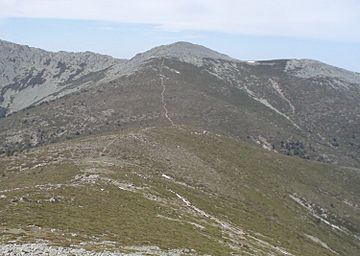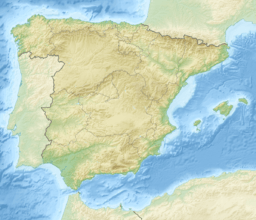La Pinareja facts for kids
Quick facts for kids La Pinareja |
|
|---|---|

La Pinareja from the Montón de Trigo
|
|
| Highest point | |
| Elevation | 2,197 m (7,208 ft) |
| Prominence | 401 m (1,316 ft) |
| Geography | |
| Location | Segovia Province, Castile and León |
| Parent range | La Mujer Muerta (Sistema Central) |
| Geology | |
| Mountain type | granite |
| Climbing | |
| First ascent | ancestral |
| Easiest route | hike |
La Pinareja is a striking mountain in central Spain. It stands tall at 2,197 meters (about 7,208 feet) above sea level. This makes it a significant peak in the Sistema Central mountain range. The mountain is known for its unique shape and the beautiful views it offers.
Contents
Where is La Pinareja?
La Pinareja is found in the El Espinar area. This is in the Segovia Province, which is part of the Castile and León region in Spain. It's the highest point of a smaller mountain group called La Mujer Muerta. This name means "The Dead Woman" in Spanish. People say the outline of the mountains looks like a sleeping woman.
Views from the Mountain
From the northern side of La Pinareja, you can see a large part of the flat plains around Segovia. It's a wide, open view. If you look towards the east, you'll see the green valleys of Valsaín and Río Moros. These valleys are known for their forests and rivers.
How to Reach the Summit
Reaching the top of La Pinareja is a popular activity for hikers. There are a few main paths you can take.
Starting Points for Hikes
- From Cercedilla: You can start your hike from this town. You'll pass through a mountain gap called Puerto de La Fuenfría, which is 1,796 meters high.
- From Navas de Riofrío: This village is at 1,267 meters. It offers another route up the mountain.
- From Revenga: This village is at 1,132 meters and is also a common starting point.
Hiking Conditions
During the summer, these paths are usually easy to follow. The weather is warm, and the trails are clear. However, in winter, things change a lot. La Pinareja often gets a lot of snow and ice. If you plan to hike in winter, you might need special gear. This includes crampons (spikes for your boots) and an ice axe to help you climb safely.
See also
 In Spanish: La Pinareja para niños
In Spanish: La Pinareja para niños
- Sistema Central


